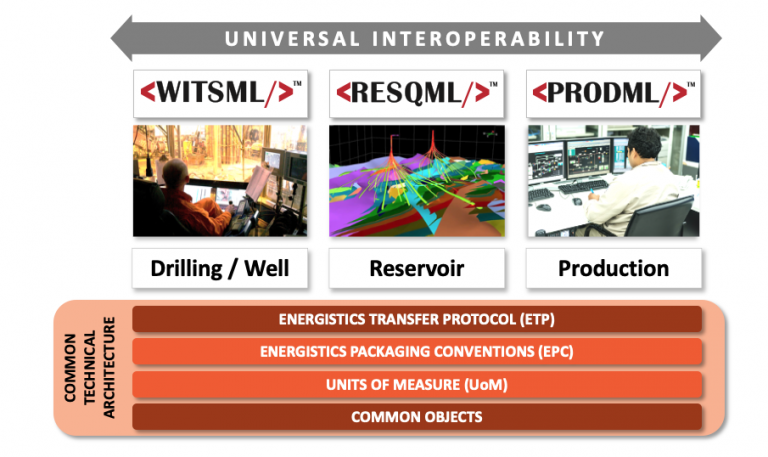
All Energistics data transfer standards released in 2016 and thereafter are now built on a Common Technical Architecture (CTA) that allows for cross-functional workflows combining any or all of the standards.
- CTA is a set of shared technology that provides a common foundation for the Energistics family of standards (WITSML, PRODML and RESQML), better harmonizing those standards and making them easier to implement.
- All of the XML schemas now comply with the design patterns of the CTA, and all use the Common elements shared across PRODML, WITSML and RESQML (for example, units of measure).

Units of Measure (UoM)
- Version 1.0 of the Energistics Unit of Measure Dictionary is intended to cover the needs of the oil & gas industry and as such is not an exhaustive list of all units of measure in existence.
- There are many units used in the medical, culinary, agricultural and other fields which are not relevant and so are not included.
- The units in the standard are intended to be those used by the industry or which reasonably would be expected to be encountered.
Energy Industry Profile Standard (EIP)
The goals of the EIP are to:
- Realize metadata standards and guidelines which enable stakeholders in the energy industry ("the community") to effectively and efficiently discover, evaluate and retrieve a diversity of information resources from widely distributed repositories and collections.
- Support both proprietary data management needs and exchange of data between and within organizations.
- Leverage existing standards to encourage adoption within the community and integration into the business and exploit existing organizational resources needed for governance and long-term maintenance.
Energistics Package Conventions (EPC)
When bringing together large amounts of data spread over many files, for the purpose of transmittal, there is a need to ensure that at the receiving end the collection of files is complete.
- It is also important to retain vital information on the relationships between the many data objects across all the files.
- To ensure these goals could be achieved, Energistics built an industry-specific standard based on the Open Packaging Conventions (OPC).
- OPC leverages the widely used ZIP file structure and was originally created by Microsoft.
- OPC is now an open standard supported by various standards organizations.
The basic characteristics of an OPC package are:
- It is a ZIP archive containing various files called parts with different (informed) content.
- It may be documented by means of metadata called core properties.
Relationships between parts are formally described, and where applicable these can also invoke external resources. This means that relationships can actually point outside the package, which includes a file on a Web or file server, a Web service address, or almost anything that can be described by a URL. Energistics has adopted all of these OPC practices and adapted them to meet the needs of its data-exchange standards, beginning with RESQML V2.0.
- This tailoring of OPC is referred to as the Energistics Packaging Conventions (EPC).
- The resulting package that contains all of the component files is referred to as an EPC file (or sometimes an Energistics package).
EPC is currently used for the transfer of RESQML project datasets and for DAS data in PRODML.
Common Objects
The Common Technical Architecture includes many objects that are shared by the different standards, simplifying the sharing of objects across the different domains. More information on common objects can be found in the documentation system Energistics Online here.
PWLS v3.0
The Practical Well Log Standards v3.0 was released in March 2021. Go to the downloads page here. Comprehensive information on PWLS can be found here.